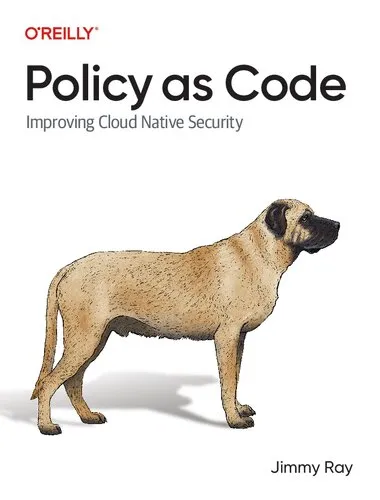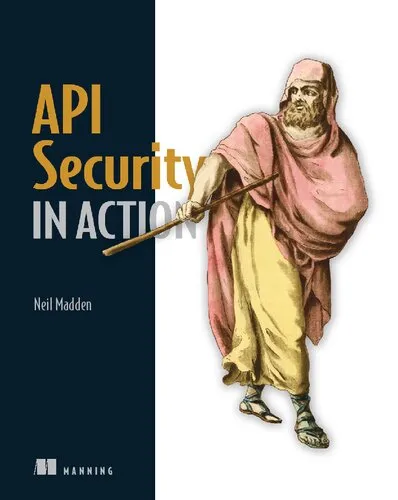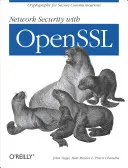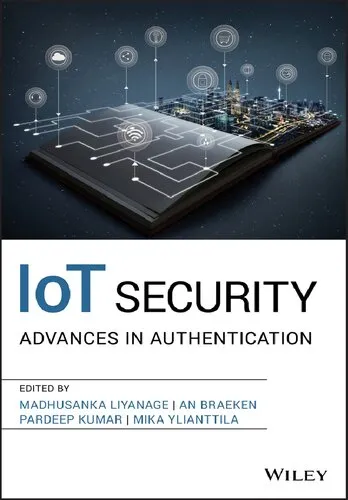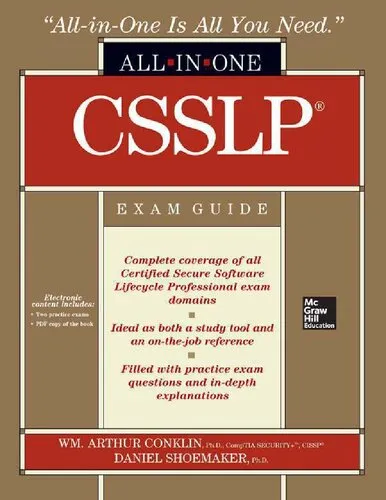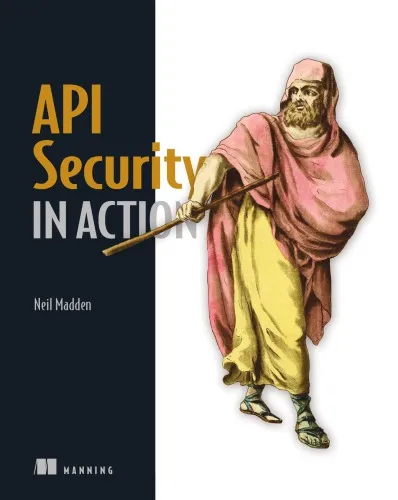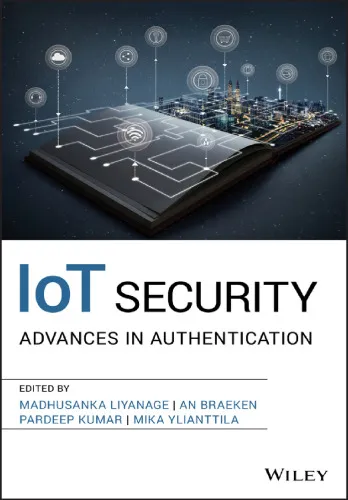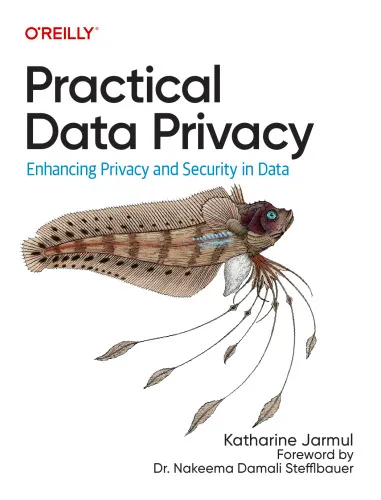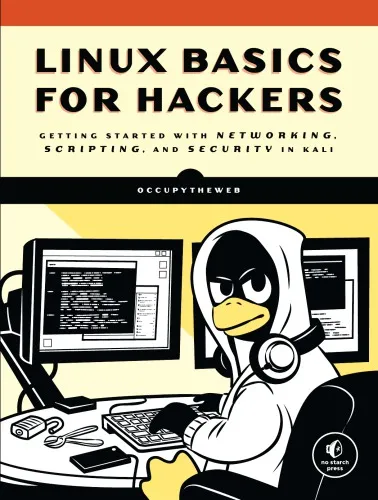Linking Sensitive Data: Methods and Techniques for Practical Privacy-Preserving Information Sharing
4.5
بر اساس نظر کاربران

شما میتونید سوالاتتون در باره کتاب رو از هوش مصنوعیش بعد از ورود بپرسید
هر دانلود یا پرسش از هوش مصنوعی 2 امتیاز لازم دارد، برای بدست آوردن امتیاز رایگان، به صفحه ی راهنمای امتیازات سر بزنید و یک سری کار ارزشمند انجام بدینکتاب های مرتبط:
خلاصه تحلیلی کتاب
کتاب Linking Sensitive Data: Methods and Techniques for Practical Privacy-Preserving Information Sharing اثر Peter Christen، Thilina Ranbaduge، و Rainer Schnell به بررسی علمی و عملی یکی از مهمترین چالشهای عصر دادهمحور میپردازد: چگونه اتصال و تحلیل دادههای حساس به نحوی انجام شود که حریم خصوصی افراد حفظ گردد. نویسندگان با تکیه بر سالها تجربه پژوهشی و کاربردی، ساختاری منظم از مفاهیم پایه تا روشهای پیشرفته ارائه میدهند.
در این اثر، مباحثی مانند Data Linkage و Privacy-Preserving Techniques بهصورت موردی و تحلیلی بررسی شدهاند تا خواننده نه تنها بتواند اصول را بیاموزد بلکه درک عمیقی از چالشهای پیادهسازی در دنیای واقعی پیدا کند. رویکرد بینرشتهای کتاب، آن را برای دانشجویان علوم داده، متخصصان امنیت اطلاعات و پژوهشگران علوم اجتماعی مناسب ساخته است.
اطلاعات مربوط به سال انتشار این کتاب «اطلاعات نامشخص» است زیرا منبع معتبر در دسترس نیست، اما محتوای آن به وضوح بیانگر بهروز بودن روشها و همخوانی با استانداردهای موجود در حوزه داده و امنیت است.
نکات کلیدی و کاربردی
یکی از برجستهترین ویژگیهای کتاب، تمرکز بر ایجاد تعادل میان دقت و حفظ حریم خصوصی در فرآیند های Data Linkage است. این چالش بهویژه در حوزههایی چون پژوهشهای پزشکی، تحلیل دادههای مشتریان یا بررسیهای جمعیتشناسی اهمیت حیاتی دارد.
نویسندگان با ارائه چارچوبهای عملی و الگوریتمهای نوین Privacy-Preserving Techniques، به خواننده کمک میکنند تا راهحلهایی مطابق شرایط خاص پروژه خود پیدا کند. مباحثی مانند روشهای رمزنگاری (Cryptographic Techniques)، استفاده از Bloom Filters، و تطبیق رکوردها (Record Linkage) به زبان ساده اما دقیق شرح داده شدهاند.
در کنار مباحث فنی، کتاب به جنبههای اخلاقی و حقوقی نیز توجه دارد و اهمیت رعایت قوانین حفاظت از داده را یادآور میشود.
نقلقولهای ماندگار
در خلال کتاب، نویسندگان جملات متعددی را بیان میکنند که خلاصهای از فلسفه و رویکرد آنها در کار با دادههای حساس است. این نقلقولها، هم دیدگاه فنی و هم ارزشهای انسانی را منعکس میکنند.
برخی از این جملات الهامبخش ماهیت علمی اثر را با ضرورت اجتماعی حفظ دادهها پیوند میدهند، و به همین دلیل برای پژوهشگران حوزه داده و سیاستگذاران ارزشمند هستند.
بزرگترین چالش در علم داده امروز، نه در کشف الگوها بلکه در احترام به حریم خصوصی کسانی است که دادههایشان را در اختیار ما میگذارند. نامشخص
فناوری بدون اخلاق، تنها ابزاری برای نقض اعتماد خواهد شد. نامشخص
چرا این کتاب اهمیت دارد
در عصر دیجیتال که تبادل دادههای حجیم به امری روزمره بدل شده، خطرات نشت اطلاعات حساس بیش از پیش مطرحاند. کتاب Linking Sensitive Data: Methods and Techniques for Practical Privacy-Preserving Information Sharing نهتنها به ابزارهای فنی برای ایمنسازی فرآیند اتصال دادهها میپردازد، بلکه اهمیت بعد اخلاقی و قانونی آن را نیز برجسته میکند.
با توجه به افزایش مقررات سختگیرانه در زمینه حفاظت از داده (مانند GDPR در اتحادیه اروپا)، دانش حاصل از این کتاب میتواند برای سازمانها و پژوهشگرانی که با دادههای شخصی کار میکنند، تفاوت بین موفقیت و شکست پروژه را رقم بزند.
نتیجهگیری الهامبخش
کتاب Linking Sensitive Data: Methods and Techniques for Practical Privacy-Preserving Information Sharing با ترکیب مباحث نظری، ابزارهای عملی و نگاه انسانی به حفاظت از دادهها، راهنمایی کامل برای هر فرد یا سازمانی است که در حوزه اتصال دادههای حساس فعالیت دارد.
اگر شما یک دانشجوی علاقه
Analytical Summary
In the complex and increasingly critical domain of data management, Linking Sensitive Data: Methods and Techniques for Practical Privacy-Preserving Information Sharing stands out as a seminal resource for academics, practitioners, and policymakers. This book, authored by Peter Christen, Thilina Ranbaduge, and Rainer Schnell, addresses the urgent necessity of integrating and analysing data about individuals while rigorously protecting privacy.
The work provides both the theoretical underpinnings and the practical methodologies for privacy-preserving record linkage (PPRL), a field that enables linkage of personal data from multiple sources without compromising confidentiality. It delves into the technical, ethical, and legal challenges inherent in handling sensitive datasets, explaining how innovative computational techniques can reconcile data utility with privacy requirements.
Balancing theoretical rigor with real-world applicability, the book introduces readers to linking sensitive data using methods such as Bloom filters and secure multi-party computation, while contextualising them within data protection regulations like the GDPR. Its depth and clarity ensure accessibility for those new to the concept and value for seasoned experts seeking advanced techniques.
Because of increasing global data exchange and heightened public awareness of privacy, an authoritative exploration of PPRL such as this is critical for anyone responsible for ethical data sharing. Whether in healthcare, social sciences, national statistics, or commercial sectors, the book equips readers with tools to enable robust data analysis without breaching trust.
Key Takeaways
This book offers more than a technical manual—it is a conceptual bridge between the need for rich, linked datasets and the imperative of privacy preservation.
Readers will grasp the underlying principles of data linkage privacy, including secure coding of identifiers and probabilistic matching.
It illustrates how to conduct privacy-preserving record linkage in diverse and restrictive environments, overcoming common hurdles such as data silos or inconsistent identifiers.
Legal and ethical considerations are interwoven with technological strategies, recognising that preserving sensitive information is as much about societal trust as it is about algorithmic design.
Industry-specific case discussions and conceptual frameworks present the breadth of PPRL applications, showing the universality of the challenge across domains.
Memorable Quotes
“Linking sensitive data without breaching privacy is not just a computational problem—it’s a societal necessity.” Unknown
“The value of data is maximised when it can be shared, but the integrity of privacy is the price we must never pay.” Unknown
“Effective privacy-preserving record linkage depends on both algorithmic innovation and institutional trust.” Unknown
Why This Book Matters
This book matters because it addresses one of the most pressing dilemmas of our information age: how to harness the collective power of disparate datasets without exposing individual identities.
By presenting a comprehensive overview of techniques for linking sensitive data, it empowers organisations to advance research, improve services, and enhance decision-making processes—all without breaching privacy laws or ethical boundaries.
Equally significant is its emphasis on practicality. Many publications stop at theory, but here the authors provide deployable strategies and tools, making the transition from classroom to real-world deployment far smoother.
The book's relevance cuts across disciplines, and for professionals mandated to share or integrate sensitive datasets, the guidance within could mean the difference between a successful, compliant project and a privacy breach with severe consequences.
Its sustained focus on privacy safeguards in data linkage also positions it as a critical resource for policy drafting, compliance auditing, and the development of ethical AI systems.
Inspiring Conclusion
In a world where data is both a vital asset and a sensitive liability, mastering the art and science of Linking Sensitive Data: Methods and Techniques for Practical Privacy-Preserving Information Sharing is an essential step toward responsible innovation.
This book invites its readers not simply to understand the mechanics of privacy-preserving record linkage but to actively contribute to a culture where data exchange enhances knowledge without eroding trust. By applying the techniques and ethical frameworks within, professionals and researchers can ensure that data sharing is both effective and respectful of personal rights.
If you are ready to lead your organisation or research project toward safe, compliant, and impactful data practices, your next step is clear: engage with this book's insights, share them with your peers, and be part of the ongoing dialogue around ethical data linkage.
دانلود رایگان مستقیم
شما میتونید سوالاتتون در باره کتاب رو از هوش مصنوعیش بعد از ورود بپرسید
دسترسی به کتابها از طریق پلتفرمهای قانونی و کتابخانههای عمومی نه تنها از حقوق نویسندگان و ناشران حمایت میکند، بلکه به پایداری فرهنگ کتابخوانی نیز کمک میرساند. پیش از دانلود، لحظهای به بررسی این گزینهها فکر کنید.
این کتاب رو در پلتفرم های دیگه ببینید
WorldCat به شما کمک میکنه تا کتاب ها رو در کتابخانه های سراسر دنیا پیدا کنید
امتیازها، نظرات تخصصی و صحبت ها درباره کتاب را در Goodreads ببینید
کتابهای کمیاب یا دست دوم را در AbeBooks پیدا کنید و بخرید
1127
بازدید4.5
امتیاز0
نظر98%
رضایتنظرات:
4.5
بر اساس 0 نظر کاربران
Questions & Answers
Ask questions about this book or help others by answering
No questions yet. Be the first to ask!


